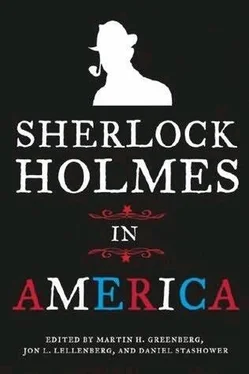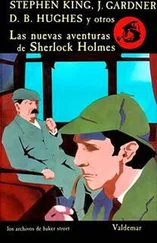We both turned and stared at Holmes in awkward disbelief.
“Why, Mr. Holmes, I am the president of this organization! You may well look at the stationery for evidence of that!” he cried.
Holmes stood and waited. After a moment of shuffling and protesting, and Holmes still impassive, Brenton’s face fell in inevitable surrender. “Wait here, gentlemen. I shall call for Mrs. Huntington Smith.”
“Did you not see, Watson,” Holmes said when we were alone, noting my confusion, “that the good colonel’s steps inside were taken with a tentative, semi-familiar measure, looking ahead at all times, as one who has been inside a structure perhaps but three or four times. Nor did a single one of the animals having the liberty of the place note his presence with recognition or happiness. An animal knows its friend is present long before he is even in sight.”
“I suppose you are right, but how did you know that a woman was the true head?” I asked, baffled.
“Simply enough, my dear Watson. If he is a man, then the real authority must not be. The only reason for his appointment would have been for the public legitimacy a man brings in the role. Then there is the fact that most organizations devoted to the humane treatment of animals and children are founded by women in this country, as in England, so that I had absolute certainty as to my trifling deduction. I had no desire to cause any embarrassment to the lawyer (or such I perceive him to be by his stance and inflection), but he can give us nothing we require.”
I was about to ask what that was, as this all seemed to me a strange detour away from more pressing enquiries, but at this point there entered a small, quick-moving woman who presented herself as Anna Harris Smith, wife of Huntington Smith, editor of the Boston Beacon .
A mongrel terrier ran up and pawed at Mrs. Smith’s leg for affection.
“Ah, there is a happy dog then!” I commented.
“You see,” she said to us, “the animals are happy because this is not an institution, but a real home. We do not like to keep any animal in limited quarters. You need not explain who you are. I have read of your arrival in my husband’s newspaper.”
“I wonder if we might have the pleasure of seeing a specific animal under your care, Mrs. Smith,” Holmes said. “Would that be much trouble?”
“We keep a very accurate account of the animals, entering upon our books every day where each animal comes from, in what condition it is when received, and how it is disposed of. When the animal is given away, an agreement must be signed in which a promise is made to treat the animal kindly, and if it is not desired, to return it to the League. We must be able to see for ourselves that the home is a good one. This may seem strict, but in this enlightened age there are still men and women who regard the lower animals as less than machines, using them if convenient, treating cats as animated mouse traps, then giving them less care than they would bestow upon a bicycle or a sewing machine.”
“That is very true!” Holmes said exuberantly, as though he had worked a difficult case to its conclusion which, looking back upon the surprises of the case, it was very possible he had.
Holmes having described the circumstances of this particular kitten’s arrival, Mrs. Smith took us at once to an enclosed room like a conservatory filled with fresh light from a roof of skylights. There, cats and kittens played, stretched, slept. Mrs. Smith began sorting through the menagerie with swift but gentle hands.
“When summer approaches, the number of animals given away or homeless increases greatly. It is a rather cruel habit of people to turn out their cats, or leave them inside to suffer and starve, while they leave Boston for the summer. Horses standing out in the heat become weak with thirst and hunger because of brutal owners who can pay less for another horse than to feed their own. They collapse in the street, or are taken by horse thieves and traded to be slaughtered. That is the end for the most faithful servant that mankind has. Does it not seem time to expect more of a Christian country?”
“There surely must be some recourse in the law, Mrs. Smith,” I suggested.
“Not presently. This summer, we have kept a score of men constantly employed in the streets following the more wretched horses and listening for alarms of theft. Here. The ribbon on her neck said her name was ‘Mollie.’”
The kitten had a flowing coat of orange and white, and she looked out and blinked at us with one blue eye and one granite gray.
“A beautiful puss,” Holmes said after the briefest look. “Now that I see your labors, I am certain my colleague Dr. Watson would agree that we have taken entirely too much of your day.”
On the way to the stairs, we passed by a room that held approximately a dozen boys and girls. They were playing very gently with some snoozing fat cat on a sofa and a sprightly kitten, while each youth stood up and told of a good deed performed toward an animal.
“That is our Kindness Club,” said Mrs. Smith to us proudly. “The children come nearly every day through the summer vacation. Many of these children would spend their evenings on the streets if not for our club, boredom leading to abuse of each other and any helpless beings. If we can teach humanity to the generation growing up, there will be no cruelty to grapple with in generations to come.”
One chubby boy was speaking about how he gave water to an emaciated horse on the street that was in weak, uncared for condition from pulling a heavy wagon. The other children applauded with sincere appreciation. After finding myself rather moved in observing, I turned back to see Holmes was speaking quietly to our guide. The only words I heard Holmes speak were “a good bargain.” The strength in that woman’s bright eye could only remind me of my very first glimpse at Holmes himself.
As we climbed into our waiting carriage again on Carver Street, an agent from the Animal Rescue League appeared at the window holding a small green bag with perforations along the side. He handed this into the carriage to Holmes. I presumed this package was connected to Holmes’s hushed talk with Mrs. Smith. The agent said that yarn was the preferred plaything, but never to be ingested.
“I believe I saw a piece of yarn at the bottom of my wardrobe. Watson, did you notice it?” asked Holmes as we drove on our way.
“What is this about, Holmes?”
Holmes opened the top of the bag. Mollie peered over the side, then fell on her back as she tried to climb onto the carriage seat. For the next several days, Holmes hardly ever left the side of the mischievous kitten in the humble confines of our rooms.
I was often left with no occupation more pressing than to watch my companion dote on Mollie as she attacked a roll of yarn. Yet, it was my forehead she would pounce on in the still hours of the night and bat her claws into my nostrils. Mollie had grown attached to Holmes and after dinners would curl up in his lap as he read a Blue Book guide to cats he had secured inexpensively.
“My dear Holmes,” I said at one point, “how long must she stay here while we attempt to concentrate on Dr. Lavey’s case?”
“Watson, I am a little surprised at your impatience with the speechless creature. She has come very close to absolving your old friend of the grave charge of murder already.”
Later that day, I sat with Sherlock Holmes at a fine restaurant he had pointed out in our guidebook among the elegant, tree-lined rows of aristocratic Boston. This outing took me quite by surprise, given my friend’s thrifty tastes. Only once we were on our way there, did I realize he had carried Mollie with us in the green bag. I suggested that the restaurant would not permit her, and, even if we were to smuggle her inside, were she to begin meowing incessantly (as was her custom), we would be thrown out.
Читать дальше












